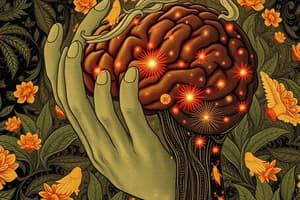Podcast
Questions and Answers
Which process involves transforming sensory data into a mental representation?
Which process involves transforming sensory data into a mental representation?
- Retrieval
- Encoding (correct)
- Recall
- Storage
In the levels-of-processing model, which type of processing is likely to lead to better recall?
In the levels-of-processing model, which type of processing is likely to lead to better recall?
- Rote memorization
- Shallow processing
- Semantic processing (correct)
- Visual processing
What is the nature of explicit memory?
What is the nature of explicit memory?
- Conscious recollection of past experiences (correct)
- Memory primarily related to procedural tasks
- Short-duration memory for actively accessed information
- An unconscious use of past experiences
Which component is responsible for managing attention in the working memory model?
Which component is responsible for managing attention in the working memory model?
What type of memory is primarily associated with personal experiences?
What type of memory is primarily associated with personal experiences?
Amnesia is primarily caused by which of the following?
Amnesia is primarily caused by which of the following?
Which of these memory systems deals with general knowledge?
Which of these memory systems deals with general knowledge?
What does the connectionist model of memory propose?
What does the connectionist model of memory propose?
Flashcards are hidden until you start studying
Study Notes
Memory Processes
- Encoding: Transforming sensory information into a mental representation. Think of it like converting raw data into a language your brain understands.
- Storage: Keeping the encoded information. This is like storing the converted data safely for later use.
- Retrieval: Accessing and using the stored information. This is like retrieving the stored data when you need it.
Measuring Memory
- Recall tasks: Re-producing information from memory, like listing all the items you need from the grocery store.
- Recognition tasks: Identifying information as previously encountered, like picking out your favorite song from a list.
Explicit vs. Implicit Memory
- Explicit memory: Consciously remembering past experiences. Think of remembering a special birthday party.
- Implicit memory: Unconsciously using past experiences, like knowing how to ride a bicycle without consciously thinking about it.
Traditional Model of Memory
- Sensory store: Very short-term memory that holds sensory information briefly, like the faint echo of a sound.
- Short-term store: Limited capacity, short-term memory for actively accessed information, like remembering a phone number just long enough to dial it.
- Long-term store: Vast capacity, long-term memory for stored information, like remembering your childhood memories.
Levels-of-Processing Model
- Deeper processing (semantic level) leads to better recall than shallow processing (visual level). Think of trying to remember a word based on its meaning versus just its appearance.
Working Memory Model
- A dynamic system that holds and processes actively accessed information. Imagine a mental workspace where you juggle different thoughts and tasks.
- Central executive: Manages attention and controls the processing of information. Like the project manager of your mental workspace.
- Visuospatial sketchpad: Holds and manipulates visual and spatial information. Imagine a mental whiteboard for visual images and locations.
- Phonological loop: Holds and rehearses verbal information. Like a mental tape recorder for sounds and words.
- Episodic buffer: Integrates information from the other components. Like the coordinator that puts everything together for a cohesive experience.
Multiple Memory Systems
- Semantic memory: General knowledge about the world like facts, concepts, and language.
- Episodic memory: Personal experiences. Think of remembering a specific event like your first day of school.
Connectionist Model
- Views memory as a network of interconnected nodes. Imagine a vast web of linked ideas and concepts. Activating one node spreads activation to other related nodes, explaining phenomena like priming and associations.
Exceptional Memory
- Mnemonists demonstrate extraordinary memory abilities. This exceptional ability often comes from using specific strategies and techniques.
Memory Disorders
- Amnesia: Loss of memory caused by brain damage or other factors, impacting the ability to access past experiences.
- Alzheimer's disease: A progressive degeneration of brain tissue leading to memory loss and other cognitive impairments.
Studying That Suits You
Use AI to generate personalized quizzes and flashcards to suit your learning preferences.




